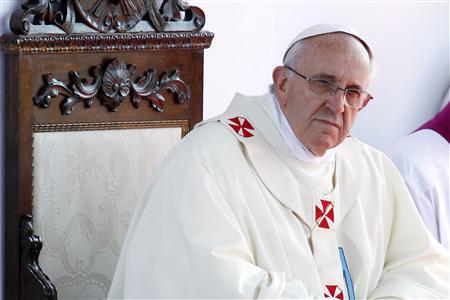U.S. Sen. Bernie Sanders, who is running for the Democratic presidential nomination, spoke on Monday morning at Liberty University. Liberty was founded by Jerry Falwell and has, under his son’s leadership, grown to be a huge and influential part of the Religious Right’s cultural infrastructure. The school has a tradition of drawing attention to itself by inviting politicians to its mandatory student convocations.
Sanders stated upfront and unapologetically that he is pro-choice and pro-gay and that he knew most of the people in the audience disagreed with him about that. His speech focused on the themes of economic hardship and inequality, urging students to grapple with the morality and injustice of poverty, huge income and wage gaps, children dying for lack of health care and Republican budget proposals to slash safety-net spending for poor children and families. Sanders, who was raised Jewish but currently claims no religious ties, quoted Pope Francis’s critique of the global economy and warnings against the “idolatry” of money.
Sanders was received politely, but there was plenty of resistance to his message, and not just on abortion or marriage equality. Nick Corasaniti at the New York Times reported from the event:
“Calling on us to help the neediest, that resonates with me as a Christian,” said Quincy Thompson, the student body president, who had a chance to briefly meet Mr. Sanders after the event. “But as a Christian, I think the responsibility to help them falls to the church, not the government.”
The idea that helping the poor is not a job for the government but for the church is a core teaching of Christian Reconstructionism that has spread throughout the Religious Right, the Tea Party, and the Republican Party, carried by people like David Barton and Michael Peroutka.
Liberty’s President Jerry Falwell, Jr. also took exception to Sanders’ approach to economics, sticking with the gospel of small government:
“I think it was Margaret Thatcher who said that the problem with socialism is that eventually you run out of other people’s money,” Mr. Falwell said in an interview after the event, making the case that he thought working toward a limited government and lowering taxes would “create the tide that rises all ships.”
A different strain of the Right took on a similar theme on Tuesday, when panelists at the libertarian CATO Institute, whose lobby features a quote from Ayn Rand, addressed Pope Francis’ critique of the global economic system at an event titled, “Blessing or Scourge? Capitalism through the Eyes of Pope Francis.” Francis will visit Washington, D.C. next week.
Catholic University of America President John Garvey and National Catholic Reporter columnist Michael Sean Winters portrayed Francis’ statements as well within the tradition of Catholic social justice teaching and in line with comments from his papal predecessors.
Jay Richards is an assistant professor in the business school at Catholic University and a senior fellow at the creationist Discovery Institute who authored a 2010 book called “Money, Greed, and God: Why Capitalism Is the Solution and Not the Problem.” Richards, whose Twitter handle is @FreemarketJay, suggested that Francis’ views on capitalism may have been distorted by his experience in Argentina, which Richards says ranks near the bottom on “economic freedom” indicators. The pope’s beef is not really with free-market capitalism, he says, but with the kind of cronyism and corporatism found in his home country— an argument that has been advanced by other Catholic conservatives but doesn’t reflect the scope of Francis’s critique of current global economic and financial systems.
The CATO panel was moderated by Marian Tupy, editor of CATO’s HumanProgress.org project. Tupy argued that the pope is ignoring evidence that capitalism has lifted millions of people out of poverty. Two of Tupy’s articles critical of Francis’s economic critiques were distributed at the event, one of which concluded condescendingly, “Pope Francis has a big heart, but his credibility as a voice of justice and morality would be immeasurably improved if he based his statements on facts.”








